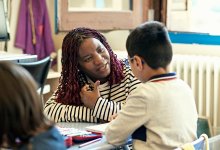- ChatGPT & Generative AI
Putting ChatGPT’s Study Mode Through Its Paces
The team behind ChatGPT admits the standard version can be used as an ‘answer machine.’ Is the new Study Mode feature any better?166Your content has been saved!
Go to My Saved Content. - Administration & Leadership
How to Create a Crisis Handbook to Prepare Your School for Emergencies
As a school leader, you can’t anticipate when a disaster may happen, but you can develop systems to help ensure that your staff and families are prepared.166Your content has been saved!
Go to My Saved Content. - Social & Emotional Learning (SEL)
5 Ways to Develop Students’ Social and Emotional Skills in Music Class
These performance-based activities can be fun for students and provide opportunities for them to develop empathy.164Your content has been saved!
Go to My Saved Content. - Classroom Management
Go-to Activities for Fast Finishers
Offering fun designated extension activities means the learning continues, even for the speediest students.Your content has been saved!
Go to My Saved Content. - Creativity
Daily Activities That Support Students’ Creative Mindset
Teachers can provide learning experiences that guide high school students to become comfortable with uncertainty and risk-taking.530Your content has been saved!
Go to My Saved Content. - Social & Emotional Learning (SEL)
How to Teach Kids to Be Kind to Themselves
Kindness toward others is often taught in elementary school, but it’s also important for students to extend it to themselves.591Your content has been saved!
Go to My Saved Content. - Social & Emotional Learning (SEL)
Integrating Social and Emotional Learning in Math Class
Teachers can use these routines to seamlessly integrate SEL into math instruction to boost students’ proficiency and encourage a positive math identity.306Your content has been saved!
Go to My Saved Content. - Classroom Management
4 Ways to Give Preschool Students Autonomy During Large Group Time
Students need clear boundaries, but they also need to feel that they belong during an activity and that their ideas shape their learning.247Your content has been saved!
Go to My Saved Content. - Administration & Leadership
A 3-Step Strategy for Addressing Difficult Situations With Parents
Administrators can resolve complicated issues by holding an information-gathering meeting, conducting an investigation, and then circling back to parents.1.2kYour content has been saved!
Go to My Saved Content. - Communication Skills
A Low-Stakes Public-Speaking Game for High School Students
By offering a quick, low-pressure way to practice, teachers can help students build their confidence and poise when talking in front of the class.
- Literacy
Just Like Phonics, Comprehension Requires Explicit Teaching
Once students can decode, they need ongoing and thoughtful instruction to understand, interpret, and engage with what they read.55.6kYour content has been saved!
Go to My Saved Content. - Teacher Wellness
The Research on Protecting Teacher Well-Being
Laurie Santos, host of the popular podcast The Happiness Lab, on how our minds deceive us, why "time affluence" matters, and what we can do to reset our parasympathetic nervous system.50kYour content has been saved!
Go to My Saved Content. - Classroom Management
60-Second Strategy: Playing Card Table Groups
Having students draw playing cards to randomize seating for small groups each week ensures that everyone experiences working with a variety of classmates.33.6kYour content has been saved!
Go to My Saved Content. - Formative Assessment
7 Low-Stakes Formative Assessment Activities
Building frequent checks for understanding into lessons can help teachers spot learning gaps in real time and adjust instruction before moving on.26kYour content has been saved!
Go to My Saved Content. - Formative Assessment
29 High-Impact Formative Assessment Strategies
These versatile strategies—from brain dumps to speed sharing—help students track their own progress while informing your next instructional steps.18.8kYour content has been saved!
Go to My Saved Content.
- Project-Based Learning (PBL)
Implementing PBL in Physical Education
At its core, high-quality PBL uses content to teach, build, and assess skills like collaboration and problem-solving—and PE classes are a natural place to continue this work.450Your content has been saved!
Go to My Saved Content. - Project-Based Learning (PBL)
Building PBL Systems That Really Encourage Students to Lead
Teachers can set up effective systems for project-based learning that support students in assuming more agency in their work.2.8kYour content has been saved!
Go to My Saved Content. - Project-Based Learning (PBL)
How to Navigate Student Absences During PBL Units
When absences accumulate, teachers can implement specific strategies so that all students complete necessary work.1.9kYour content has been saved!
Go to My Saved Content. - Technology Integration
A Virtual Collaboration Project Centered on American Democracy
In a program sponsored by the Smithsonian, students in two different parts of the country interact to explore a civics question that is meaningful to both groups.1.1kYour content has been saved!
Go to My Saved Content. - Project-Based Learning (PBL)
Problem-Based Learning and Future-Ready Skills
Well-designed projects help students build valuable skills such as collaboration, critical thinking, and communication.5.6kYour content has been saved!
Go to My Saved Content.
- Differentiated Instruction
4 High-Quality Math Enrichment Tasks
These low-floor, high-ceiling problems support differentiation, challenging all students by encouraging flexible thinking and allowing for multiple solution paths. - Differentiated Instruction
4 Ways to Make Story Problems More Engaging and Accessible
Four simple strategies—beginning with an image, previewing vocabulary, omitting the numbers, and offering number sets—can have a big impact on learning.2.1kYour content has been saved!
Go to My Saved Content. - Student Engagement
Taking Your Read-Alouds From Interactive to Immersive
Story time is a highlight of the day for many young students, and teachers can boost engagement even further by adding costumes and sound effects.3.4kYour content has been saved!
Go to My Saved Content. - Differentiated Instruction
A 6-Step Plan for Differentiated Instruction
Middle school teachers can follow a straightforward method that facilitates customization of support for students.4.3kYour content has been saved!
Go to My Saved Content. - Classroom Management
How to Differentiate Without Splitting Students Up
Advice for teachers who want to make sure everyone in their classroom works and learns in tandem.80.3kYour content has been saved!
Go to My Saved Content.
- Administration & Leadership
How Tech Tools Can Simplify and Improve Your Multi-Tiered System of Supports
This middle school made gains in supporting students by setting up shared spreadsheets, digital referral forms, and predictable routines.1.4kYour content has been saved!
Go to My Saved Content. - Teacher Wellness
The Research on Protecting Teacher Well-Being
Laurie Santos, host of the popular podcast The Happiness Lab, on how our minds deceive us, why "time affluence" matters, and what we can do to reset our parasympathetic nervous system.50kYour content has been saved!
Go to My Saved Content. - Mental Health
12 Graphic Novels About Mental Health
These books help students explore conditions that they or their peers may be experiencing, such as depression and anxiety. - Mental Health
5 Strategies to Deescalate Behavior When Students Are Dysregulated
Students may lack the skills to control their behavior when they’re upset, and these steps can help build self-regulation.7.9kYour content has been saved!
Go to My Saved Content. - ChatGPT & Generative AI
Schools Try AI as Student Mental Health Needs Surge
Social and emotional, behavioral, and mental health needs are outpacing what schools can provide. Can technology—namely AI—step in to help?5.2kYour content has been saved!
Go to My Saved Content.




























